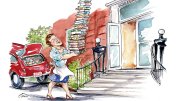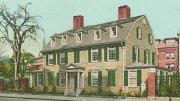 |
|
"Your wooden arm you hold outstretched to shake with passers-by."
|
Seventy years ago, on September 21, came the New England Hurricane of 1938: a.k.a. the Long Island Express, owing to the unprecedented forward speed (60 mph) with which it made landfall there at 3:30 in the afternoon; a.k.a. the Big Blow, with the Blue Hill Observatory near Boston measuring sustained winds of 121 mph and gusts to 186 mph. In hours, the tempest killed more than 600 people and destroyed many thousands of buildings.
It was mighty. The late Alistair Cooke, G ’34, wrote that the storm surge lifted a cinema in Westhampton, New York, and carried the building, 20 people watching a matinee, and the projectionist two miles out into the Atlantic to their deaths.
Winds and water brought New York, Connecticut, and Rhode Island the worst natural disaster in recorded history. The Connecticut River Valley was awash. Swollen by up to 17 inches of rain, the river rose to 10 feet above flood stage at Springfield, Massachusetts. Residents of Ware, in the central part of the state, were marooned by water for days and relied on air-dropped food and medicine.
The storm devastated New England’s forests, downing, for instance, 70 percent of the trees in the Harvard Forest in central Massachusetts, damage still discernible in the canopy. Harvard College got off relatively lightly, but Radcliffe’s superintendent of buildings and grounds died while trying to remove a tree that fell on Fay House.
The storm hit just as freshmen were due to arrive in Cambridge, and only about two-thirds of them could present themselves at Memorial Hall on the 23rd to register. The New York Times reported that one group of freshmen traveling from New York arrived late because they were aboard a train “three cars of which were swept away by the tidal wave at Stonington, Connecticut.” Yet, despite these interferences, “the freshman program of conferences and addresses by President Conant and members of the faculty continued according to schedule.”
The dean of the College, Chester Hanford, had a role in these proceedings, but he was much distracted. His wife, Ruth, and son George had gone to Ware, in central Massachusetts, to help her brother in a political campaign and now were cut off by the floods—without drinking water, electricity, telephones, or fire protection.
To mark the storm’s anniversary, George Hanford ’41, M.B.A. ’43, has written an article about it for his retirement community’s in-house magazine that quotes from an unpublished memoir by his mother. The calamity revealed to her that President James Bryant Conant was not the cold fish many thought him to be.
When she and George became incommunicado, she wrote, “my husband completely lost his calm, and no one sympathized more with his dilemma or was more helpful than Mr. Conant. He was the one who urged Chester to leave his work and try to get through to his family. He it was who ordered a car equipped with a short-wave radio transmitter to proceed as near to the lost town as possible to see if it could pick up word of us.” The dean got as far as the top of a mountain two towns south of Ware and stayed there for more than a day, receiving and sending messages. When the state police finally got him through, he found his wife working as a cook to feed emergency workers and his son pitching in as a linesman, a wood chopper, a truck driver, and a policeman—both greatly enjoying themselves. “There are those,” Ruth Hanford wrote, “who maintain that Mr. Conant is too much the scientist to be sympathetic in his human relationships. I have seen nothing of the sort.”
Crimson wins gold: Four chefs from Harvard Dining Services, captained by director for culinary operations Martin T. Breslin, finished second and won gold medals in an American Chefs Federation-sponsored competition June 20 at the University of Massachusetts, Amherst. Presented a basket of surprise ingredients, the competitors had 40 minutes to plan a three-course meal for four and a buffet for 12, using up the ingredients with tact. The Crimson team scored 36.4 points out of a possible 40; only food-service company Delaware North did better.
The chefs had three hours to cook and 15 minutes to plate their meals, without benefit of an oven and using only four burners. They dished up seafood chowder; a salad of pan-seared strawberries, goat cheese, greens, and almonds; pan-roasted duck; and pork medallions with fruit stuffing on crispy eggplant with a Dijon Chardonnay cream sauce.
Applause, please, undergraduates.
~Primus V








